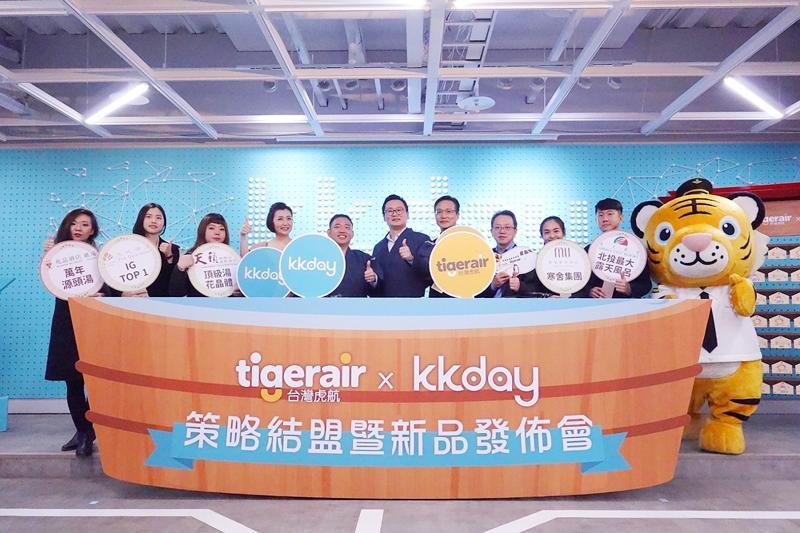Travel e-commerce platform KKday has launched a service that allows people with iPhones to visit popular attractions with greater ease and convenience, as the COVID-19 pandemic speeds up digital transformation for organizations and individuals.
KKday users can access the new service by using App Clips introduced for Apple Inc’s iOS 14, the local company said, adding that the service is currently limited to Taipei, but would soon be extended to other parts of Taiwan.
People planning to visit the Taipei Children’s Amusement Park, the Maokong Gondola or Taipei Arena Ice Land can scan an App Clip code with their iPhone to enjoy quick and contactless ticketing services, it said.

Photo courtesy of Tigerair
Users select and purchase tickets with Apple Pay without ever downloading an app, it added.
After completing a ticket purchase, users receive a QR code so that they can use their iPhone to validate the digital ticket voucher to be admitted to their chosen venue, it said.
The service frees users from waiting in long ticket lines at venues or touching a ticketing kiosk, it said, adding that it has partnered with Taipei Rapid Transit Corp (TRTC) to provide a NT$50 discount to users who pay with a Visa card through Apple Pay.
A consumer behavior survey conducted by KKday showed that 77 percent of users prefer to search for experience products on their smartphone and about 35 percent have become accustomed to mobile payment tools through KKday’s app.
More than 4 million users have so far used KKday’s electronic voucher verification service, it said.
KKday is the first tourism operator in broader China to introduce a service such as the App Clip.
“The pandemic has not hampered KKday’s efforts to enhance tourism experiences through digital innovation,” chief executive officer Chen Ming-ming (陳明明) said.
In the post-pandemic era, digital services are to play a greater role in tourism, especially in the areas of ordering, payment and customer service, Chen said, adding the KKday App Clip meets these needs.
TRTC and KKday have joined forces to provide digital upgrades for disease prevention in the pandemic, KKday said.
TRTC has expressed plans to extend the KKday App Clip service to all transportation, as well as entertainment and education venues in northern Taiwan, it said.
Government agencies and recreational facilities should embrace contactless payment systems featuring one-stop solutions in more consumer situations to meet people’s desire for fast and convenient payment that also boosts disease prevention, Chen said.
KKday aims to serve more than 10 million users and ultimately provide its digital services in all major tourism and payment situations nationwide, he said.

CAUTIOUS RECOVERY: While the manufacturing sector returned to growth amid the US-China trade truce, firms remain wary as uncertainty clouds the outlook, the CIER said The local manufacturing sector returned to expansion last month, as the official purchasing managers’ index (PMI) rose 2.1 points to 51.0, driven by a temporary easing in US-China trade tensions, the Chung-Hua Institution for Economic Research (CIER, 中華經濟研究院) said yesterday. The PMI gauges the health of the manufacturing industry, with readings above 50 indicating expansion and those below 50 signaling contraction. “Firms are not as pessimistic as they were in April, but they remain far from optimistic,” CIER president Lien Hsien-ming (連賢明) said at a news conference. The full impact of US tariff decisions is unlikely to become clear until later this month

With an approval rating of just two percent, Peruvian President Dina Boluarte might be the world’s most unpopular leader, according to pollsters. Protests greeted her rise to power 29 months ago, and have marked her entire term — joined by assorted scandals, investigations, controversies and a surge in gang violence. The 63-year-old is the target of a dozen probes, including for her alleged failure to declare gifts of luxury jewels and watches, a scandal inevitably dubbed “Rolexgate.” She is also under the microscope for a two-week undeclared absence for nose surgery — which she insists was medical, not cosmetic — and is

GROWING CONCERN: Some senior Trump administration officials opposed the UAE expansion over fears that another TSMC project could jeopardize its US investment Taiwan Semiconductor Manufacturing Co (TSMC, 台積電) is evaluating building an advanced production facility in the United Arab Emirates (UAE) and has discussed the possibility with officials in US President Donald Trump’s administration, people familiar with the matter said, in a potentially major bet on the Middle East that would only come to fruition with Washington’s approval. The company has had multiple meetings in the past few months with US Special Envoy to the Middle East Steve Witkoff and officials from MGX, an influential investment vehicle overseen by the UAE president’s brother, the people said. The conversations are a continuation of talks that

Alchip Technologies Ltd (世芯), an application-specific integrated circuit (ASIC) designer specializing in artificial-intelligence (AI) chips, yesterday said that small-volume production of 3-nanometer (nm) chips for a key customer is on track to start by the end of this year, dismissing speculation about delays in producing advanced chips. As Alchip is transitioning from 7-nanometer and 5-nanometer process technology to 3 nanometers, investors and shareholders have been closely monitoring whether the company is navigating through such transition smoothly. “We are proceeding well in [building] this generation [of chips]. It appears to me that no revision will be required. We have achieved success in designing